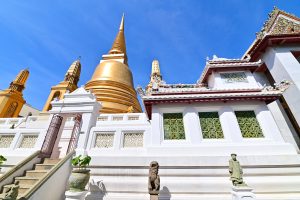Wat Bowonniwet Vihara sits on a busy street in the heart of Bangkok’s historic district. The Buddhist temple serves as the headquarters of a monastic sect with close ties to the Thai royal family.
On the evening of January 7, a gunman fired two shots near a side entrance to the temple complex. Former Cambodian lawmaker Lim Kimya was murdered at point-blank range on Thanon Bowon Niwet as he disembarked from a public bus.
The contract killing on the doorstep of a “first-class royal monastery” was an unsettling incident for Thailand’s capital during peak tourist season. The crime had “tarnished the image of Bangkok as a safe place for foreign tourists,” commented a leading local newspaper.
The city experienced a surge in tourism in January, with more than 2 million international arrivals, an increase of nearly 20 percent over the previous year. According to Euromonitor International, Thailand’s capital was the most visited city in 2024, with 32.4 million foreign visitors.
Among the tourists who visited the gilded ordination hall of Wat Bowonniwet in early January were three U.S.-based grandsons of the late King Bhumibol Adulyadej. Photos show the royal offspring kneeling before the central Buddha figure containing their ancestors’ ashes.
The monastery played a significant role in shaping the modern history of Thailand. Abbots at Wat Bowonniwet were instrumental in developing a national identity rooted in Theravada Buddhism. A long line of kings, including the current monarch, Maha Vajiralongkorn, resided on the premises as monks.
The crime occurred at a crowded bus stop steps from the temple entrance. CCTV footage showed the accused parking a red Honda motorcycle in an area where street food vendors, tourists, and tuk-tuks jostled for space. The gunman crossed the street, fired two shots, and raced back to his bike to make a quick getaway, driving past Wat Bowonniwet.
“Surrounded by a pool of blood, Lim Kimya lay on his back, clad in a blue polo shirt and white shorts. . . a small blue suitcase lay nearby,” reported the Bangkok Post. His wife, a witness to the killing, looked on as paramedics attempted CPR on the victim.
Anne-Marie Lim’s testimony in a Bangkok court confirmed that the incident occurred during the evening rush hour as the couple unloaded their luggage from the bus. She heard what sounded like firecrackers and belatedly realized her husband was the victim of a shooting. Anne-Marie positively identified the gunman at the police station based on a photograph.
“Thailand’s international reputation is on the line in this case, and the Thai police and politicians should recognize they can’t just sweep this brutal murder under the rug,” said Phil Robertson, a human rights and labor activist.
Elaine Pearson, Asia director at Human Rights Watch, told the New York Times that the “blasé” nature of the killing during daylight hours was a “terrifying” reminder that “no one is safe.”
Thailand’s Prime Minister Paetongtarn Shinawatra urged the Metropolitan Police Bureau to expedite the search for the gunman, an ex-Thai marine who was arrested in Cambodia a day after the killing. Thailand’s criminal court issued arrest warrants for Cambodian nationals connected to the crime, including the spotter on the bus, who alerted the shooter to Lim Kimya’s location, and Ly Ratanakraksmey, who allegedly orchestrated the killing.
The head of the Metropolitan Police indicated that Ly was an adviser to former Prime Minister Hun Sen. However, Cambodian media reported that the accused was dismissed from his official position and was no longer associated with the ruling party. Cambodian Prime Minister Hun Manet vehemently denied that his government was involved in the shooting. “Let Thailand handle it,” he added, referring to the investigation.
A member of parliament representing Bangkok urged the government to speed up the case, pointing out that the capital’s reputation as a safe space was at stake. Piyarat Chongthep of the opposition People’s Party said, “let them not think anyone who wants to kidnap someone, kill anyone, bring any foreign actors to another country can go to Thailand.”
The cross-border political vendetta that played in the vicinity of an elite Buddhist monastery was an unwelcome distraction at the height of the winter tourist season.

































